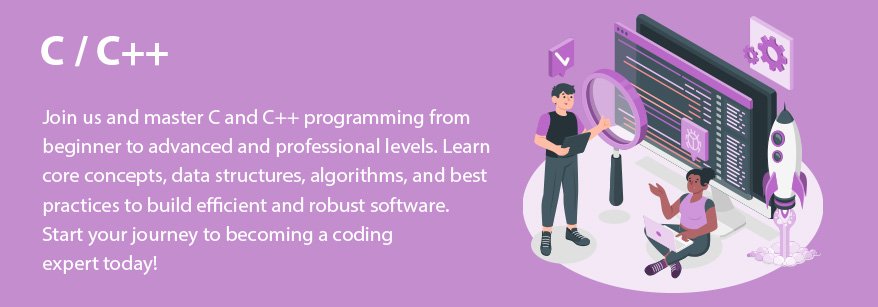C is a general-purpose, procedural programming language known for its efficiency and control over system resources. It is widely used for system programming, embedded systems, and developing operating systems. At GoWebTech, our C and C++ training institute in Indore offers comprehensive C and C++ courses designed to build a strong programming foundation for aspiring developers.
C and C++ Training Institute in Indore Courses Details
Module 1 : Introduction to C
- History & Features of C
- Applications of C
- Compiler vs Interpreter
- Comparision C and C++
- Setting Up a C Development Environment (GCC, CodeBlocks, VS Code)
- Writing & Executing a Simple C Program
- Identifiers in C Language
- Data Types & Variables (int, float, char, double)
- Constants & Keywords
- Operators (Arithmetic, Relational, Logical, Bitwise)
- Input & Output (printf, scanf)
Module 2 : Control Statements
- Conditional Statements (if, if-else, switch-case)
- Looping Constructs (for, while, do-while)
- Jump Statements (break, continue, goto)
Module 3 : Functions in C
- Defining & Calling Functions
- Function Arguments & Return Values
- Recursion (Factorial, Fibonacci, etc.)
- Storage Classes (auto, static, extern, register)
Module 4 : Arrays & Strings
- Declaring & Initializing Arrays
- Single-Dimensional & Multi-Dimensional Arrays
- String Handling (strlen, strcpy, strcat, strcmp)
- Array vs. Pointer Notation
Module 5 : Pointers in C
- Introduction to Pointers & Memory Addresses
- Pointer Arithmetic
- Function Pointers
- Dynamic Memory Allocation (malloc, calloc, realloc, free)
Module 6 : Structures & Unions
- Defining & Using Structures (struct)
- Array of Structures
- Nested Structures
- Union (union vs. struct)
- Enumerations (enum)
Module 7 : File Handling in C
- File Operations (fopen, fclose, fread, fwrite)
- Text & Binary File Handling
- File Pointers (fseek, ftell, rewind)
Module 8 : Preprocessor Directives
- Macros (#define)
- Conditional Compilation (#ifdef, #ifndef, #endif)
- Header Files (#include)
Module 9 : Advanced Topics
- Linked Lists (Singly & Doubly)
-
Stacks & Queues (Using Arrays & Linked Lists)
- Trees & Graphs (Basic Implementation)
Module 10 : Project & Case Studies
- Simple Calculator
-
Student Record Management
-
Banking System
C++ is a powerful, high-performance programming language widely used for system programming, game development, embedded systems, and applications requiring high-speed execution.
Module 1 : Introduction to C++
- Overview of C++ and its history
- Setting up a development environment (e.g., GCC, Clang, Visual Studio)
Module 2 : Basics of C++ Programming
- Data types and variables
- Operators and expressions
- Control flow (if-else, loops, switch-case)
- Functions and parameter passing
Module 3 : Object-Oriented Programming (OOP) in C++
- What is a RESTful API?
- Classes and objects
- Constructors and destructors
- Inheritance and polymorphism
- Encapsulation and abstraction
Module 4 : Advanced C++ Concepts
- Pointers and memory management (dynamic allocation)
- File handling (reading/writing files)
- Exception handling
- Templates and generic programming
Module 5 : Standard Template Library (STL)
- Vectors, lists, and other container classes
- Iterators and algorithms
- Function objects and lambda expressions
Module 6 : Best Practices and Optimization
- Code efficiency and debugging
- Design patterns in C++
- Performance tuning techniques
Key Features of Our C and C++ Courses in Indore
- Certification : Upon completion, many courses offer a certificate of completion that can be useful for career advancement and job opportunities.
- Affordable course fees
- Interview Prepation
- Dedicated Success Coach for Every Student
- We provide quality content
- Live seminars are organized by expert developers
- We provide training from IT experts
- 100% Placement Support

